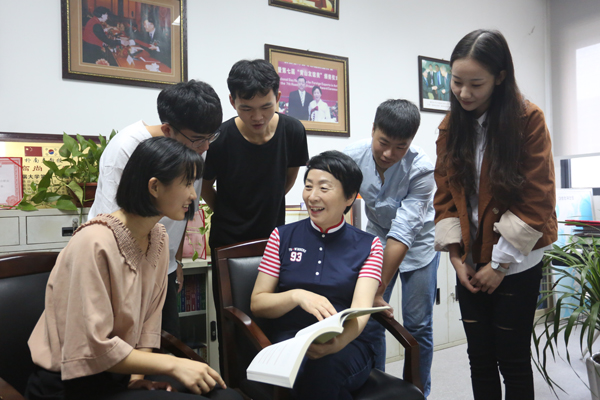A true friend of China
By Zhu Lixin | China Daily | Updated: 2017-09-25 07:06
 |
| Cho Sung-hye talks with her students at Hefei University in Anhui province. Wang Xun/China Daily |
Editor's Note: The Communist Party of China will hold its 19th National Congress on Oct 18. In the runup to the meeting, China Daily asked a prominent South Korean teacher to talk about her experiences in promoting educational improvements, business cooperation and people-to-people understanding in her native country and her adopted home.
Over the last 21 years, South Korean teacher Cho Sung-hye has contributed much to the friendship between the people of her country and China.
A teacher of Korean at Hefei University in Anhui province, Cho has helped to boost the two countries' ties in multiple aspects-not just in education.
In 2002, she became the first person from her country to receive China's Friendship Award, the highest honor given to foreigners by the central government. And she was the first South Korean citizen to gain permanent residency in China in 2006. In 2010, she was listed as one of the most influential women of the century in Hefei.
"My husband and I came to China-to Hefei-to fulfill my elder son's dream. We didn't expect that we would come to love the country as much as we do," said Cho, who speaks fluent Mandarin.
Cho was born in Seosan, South Korea. Before coming to China as an adult, she worked at Soon Chun Hyang University as a teacher.
"When the eldest of my two sons was in the third year of middle school, his history teacher, who had some experience in China, suggested the students go to live there and have a close look at the old country," Cho said.
The boy-a great fan of Chinese history who was able to give the names of more than 900 figures in the Chinese classic Romance of Three Kingdoms-was inspired and wanted very much to follow the suggestion.
"He wanted to go to the inland provinces, and he had some knowledge of Anhui, so he chose Hefei as his destination," Cho said. She herself knew little of the province or its capital at that time, so she decided to have a look before taking her family there.
"On the visit to Hefei, I found it was not very developed but thought it would have great potential. Dozens of universities are located here, including the University of Science and Technology of China, one of the country's best," she said.
Within a year, she moved to the city with her husband, Park Nam-gyu, and her sons. The couple found employment quickly at Hefei University and began teaching Korean the next year. The university was the first in the province to have such a course.
After finishing middle school and high school studies in the city, Cho's elder son was admitted to Peking University for undergraduate studies, and then returned to Hefei later for his MBA at the University of Science and Technology of China. The younger one attended Anhui University of Chinese Medicine and earned bachelor's and master's degrees there.
After about a year in Hefei, Park took a job in the United States and tried to persuade Cho to give up Hefei.
"I told him that we had just started here and we should at least spend five years in the city before judging whether we should move to another place," Cho said.
























